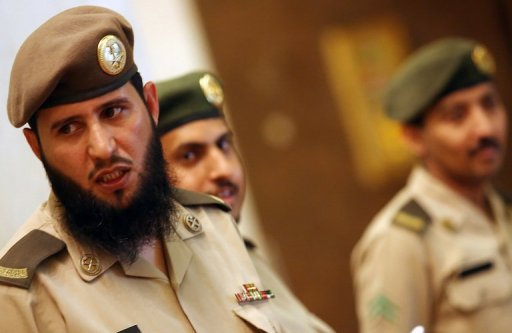
AFP PHOTO / HASSAN AMMAR
Saudi Arabia put four people to the sword on Tuesday for separate crimes committed in the conservative and predominantly Sunni kingdom, according to statements published on the SPA news agency by Saudi Arabia’s Interior Ministry. Of the four people executed, one was a Palestinian man, while the other three were Saudi nationals.
In the south-western city of Jizan, two Saudi nationals, Mohammed bin Ahmed Kharmi and Musa bin Mohsen Kharmi, were convicted of armed robbery and beheaded for luring an unidentified man into a trap and shooting at him. According to the SPA, the two men “stole the money he was carrying, which belonged to the company he works for.” The decision to hand down the death sentence was “due to the danger of their crime.”
In a separate statement by the ministry, the SPA reported the beheading of a Palestinian man known as Wael Anbar in the city of Jeddah for stabbing to death a Yemeni man known as Nasser Haqqash. A third statement followed saying that a fourth beheading took place in the city of Buraida after a Saudi national by the name of Saad Al-Mansouri was found guilty of killing a Saudi citizen over a dispute.
None of the statements mentioned when these people were arrested or under which conditions they were tried.
Saudi Arabia has a long history of corporal punishment for a plethora of crimes and does not shy away from applying these laws to foreigners. According to AFP, Saudi Arabia has carried out the death penalty on 57 people this year. Amnesty International estimated the number of people executed in Saudi Arabia last year at 79. The death penalty is applicable to a myriad of crimes which include murder, armed robbery, drug trafficking, rape and apostasy, as per Saudi Arabia’s version of Islamic Sharia Law.
On Monday the Egypt Independent reported four Egyptians had been sentenced to 70 lashes each and an additional three years in prison, while three others were sentenced to 50 lashes each and one year in prison.
Gamal Eid, director of the Arab Network for Human Rights Information based in Cairo, told the Daily News Egypt that this phenomenon is not new and expects it will get worse. Eid criticised Saudi Arabia saying that it “is a country that hates the Egyptian revolution and wants to embarrass us. And they will continue breaching Egyptian’s rights so long as our government remains passive.”
Eid is referring to the detention, torture, murder and humiliation many Egyptians have faced in Saudi, such as the case of Najla Yehya Wafa, who was arrested in 2009 following a business dispute with a princess of the Saudi royal family. Yehya Wafa was held in prison for a year and a half before she was handed her sentence; 500 lashes and five years in prison. Since her arrest, NGOs such as Alkarama, based in Geneva, have unsuccessfully championed Yehya Wafa’s cause.
“Saudi Arabia is a signatory of the United Nations Convention against Torture, but its human rights record is full of breaches of this convention: arbitrary arrests, torture, and degrading treatment of Saudi citizens, and especially of foreign workers are commonplace,” the organisation said in an August statement.


